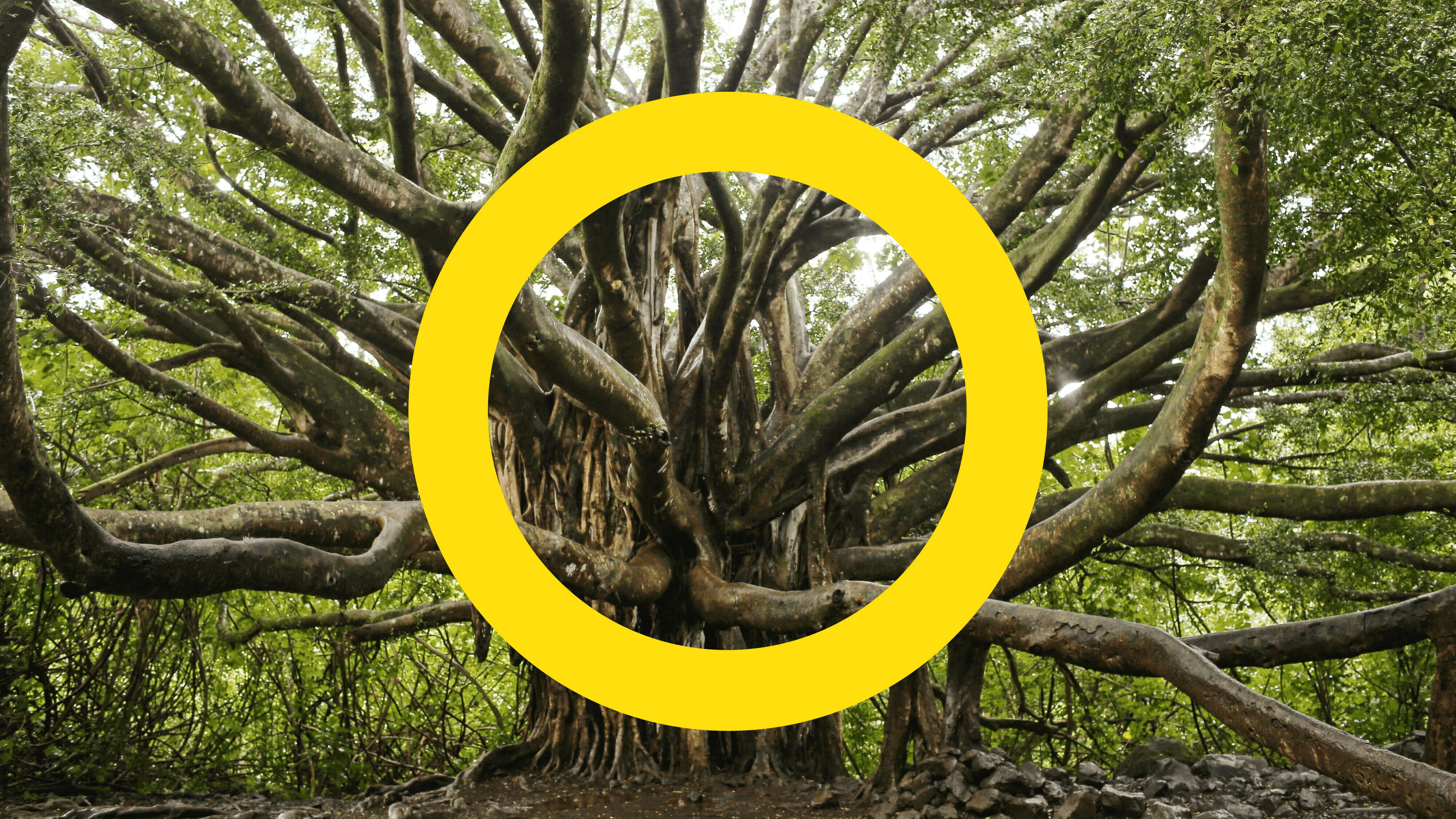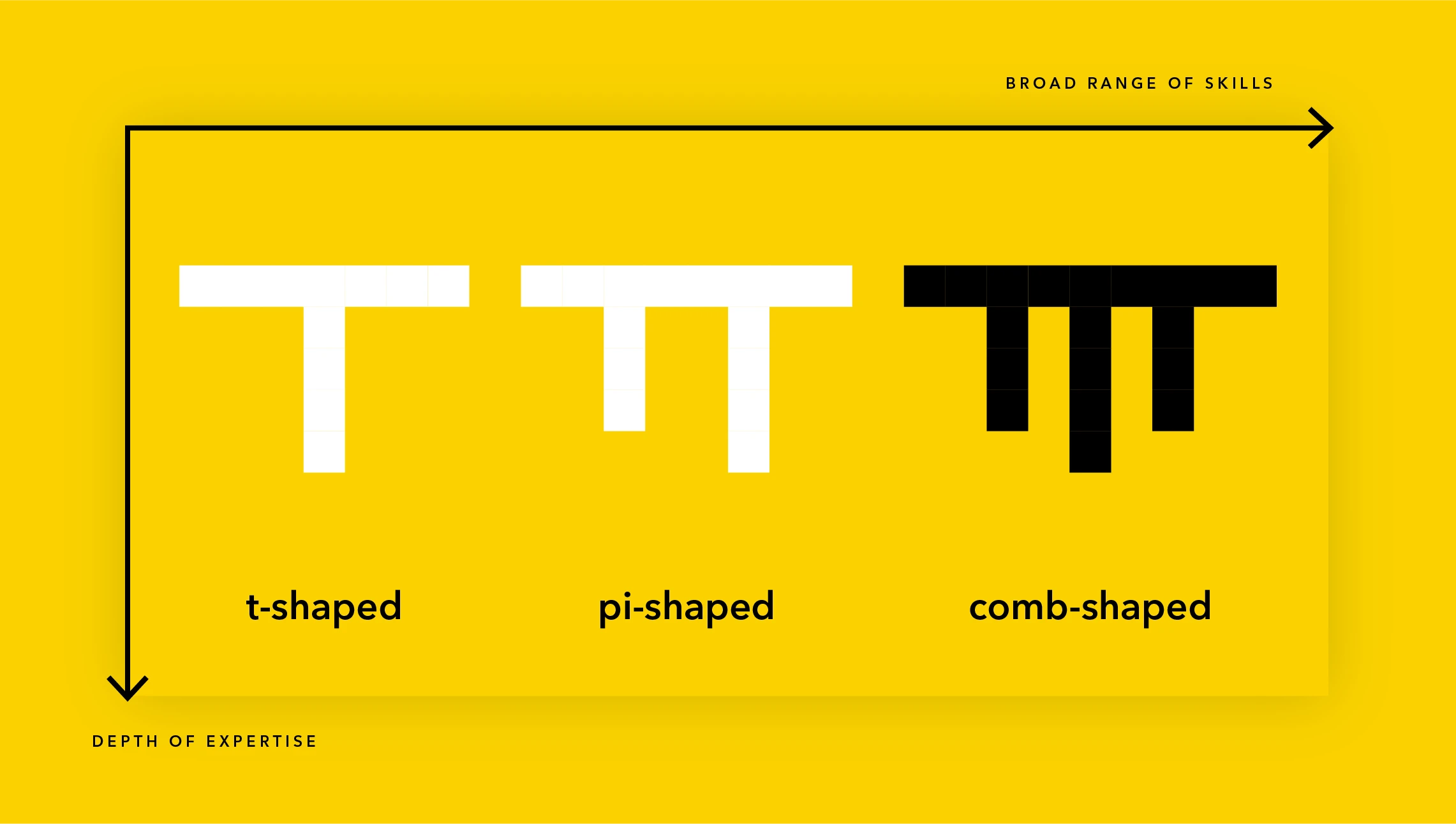
How to recognise a company with a growth mindset
Digital services is an area that attracts people who like to learn. Team members with versatile skills and broad knowledge must be taken seriously and promoted on flexible career paths, because the company benefits from this. For us, there are 5 indicators that distinguish a modern career-friendly company.
Lately, you hear the same story repeatedly in job interviews, "I've been working at a largeservice integrator/digital service agency for years, and I feel stuck. I'm still handing offsmall pieces of large projects without getting a full picture of what a client needs. Tomove to the next career phase, I need to find a job where I'm not locked into onespeciality or, worse, one project. I need opportunities to advance in the organisationwithout waiting for someone else to step out."
T-Shape, Pi-Shape or M-Shape-career?
Finding a company that supports this kind of flexible career path is easier said than done. Hiring people with a classic "T-shaped" skill profile, i.e., people with one primary area of expertise and extensive knowledge in surrounding areas makes sense for large service integrators and agencies.

Clearly defined roles make it easier to manage the organisational chart. When the market changes significantly, these agencies have the opportunity to hire many new members with the right "T-shaped" skill profiles.
But being locked into a specific T-shape can lead to stagnation. Those who focus exclusively on one speciality for years risk becoming irrelevant in the rapidly changing digital space.
A T-shaped career path can also be boring for many people. Digital services is an area that attracts people who are eager to learn. This curiosity often leads to a "Pi-Shape" and eventually a "Comb-Shape" (aka M-Shape) of skills. This includes a broad range of high-level horizontal knowledge and skills and many different competency areas.
In addition to developing more marketable skills, comb-shaped learning can lead to unique and exciting career paths. A company that invests in cross-training opens up opportunities to apply new skills. By supporting a "fail fast and learn fast" mentality, the company becomes an excellent career accelerator for these types of learners.
5 indicators for M-Shape-career possibility
These 5 indicators will tell you if a company provides these types of career opportunities in digital services.
- What does the company's technology stack look like?
- Are the solutions designed holistically?
- Are there end-to-end solutions?
- Are "global" teams really global?
- Are clients committed to member development?
What does the company's technology stack look like?
Does the company help customers evolve with digitalisation, or are outdated technology projects the be-all and end-all of the business? Are various solutions offered, or are all customers pushed to the latest and fanciest tools? How is the company preparing existing teams for the next wave of innovation or technology shift?
At the beginning of our partnership with commercetools, the MACH approach was not widely used. Not many members had direct experience with it. We looked for members with solid foundations in common programming languages and trained our teams internally. As a result, we were one of the first companies to bring modern commerce solutions to market. Our members have gradually gained high-quality skills and experience. As we continue to evolve, the mindcurv group is now building expertise in areas such as Salesforce implementation and data science to support our customers throughout the digital experience journey.
Are the solutions designed holistically?
Working in an agency that offers only run-of-the-mill solutions become boring for people who draw their motivation from complex challenges. It is much more exciting and better for the business if the solutions are tailored to each client's strengths, constraints and desired business outcomes.
In digital services agencies with a holistic approach, team members are encouraged to develop a comprehensive understanding of their projects, regardless of their role. Insights are shared across departments and projects. This enables members to gain industry knowledge and horizontal skills quickly. In the process, new career paths open up for them.
Holistic companies choose approaches to complete their projects. Causes could include the requirements of an existing technology stack or business model or constraints such as a limited time to market or a tight budget.
The technology is chosen to fit the use case.
Are there end-to-end solutions?
Agencies that only do implementations for clients will have a different focus than those that support clients holistically from start to finish. As your team evolves and maintains the platform, there is more incentive to think about long-term outcomes and complex use cases.
On the one hand, this means promising challenges; on the other, it provides an opportunity to explore different areas of expertise.
At mindcurv group, we work with clients from initial ideation to long-term platform development. Recently, we’ve joined forces with partners in Salesforce implementations and support, high-end software development, multimedia design/UX, retail consulting and data science. This expands our portfolio - and career opportunities within mindcurv group - across the digital spectrum.
Are "global" teams really global?
Although remote work is widespread, many companies still believe that certain functions are tied to specific regions. Look at the various roles in different countries to see if you have enough upward mobility or if the company is stuck in an outdated onshore/offshore model.
At mindcurv group, we believe in teamwork. Key roles are distributed across different regions based on skill and competency in our projects. We are developing a cloud platform implementation for German clients with a team consisting of an infrastructure architect in India, infrastructure developers spread across Spain, Germany and India, and a project manager in Germany.
The right person can take on their role from anywhere in the world. As a result, you build teams with a unique blend of talent and culture that deliver creative solutions. Companies with rigid organisational charts, on the other hand, miss out on huge potential.
Are clients committed to member development?
For example, one of Mindcurv's first members started as a functional tester but became more interested in the business side of the job as he gained experience in e-commerce. His main client was aware of his skills and was happy for him to split his work time between testing and analysis, which over time, brought him a full-time position as a business analyst.
Many companies support their service providers’ professional development and are the biggest promoters when moving to a new position. Provided the change is understandable.
Can the company provide examples where members grew into a new position through their projects? Was there a clear timeline for how and when responsibilities changed?
Time to take the next step
The mindcurv group is always looking for people to drive creative solutions in the digital landscape. If you enjoy continuous learning and are not afraid of top-down strategies or bottom-up implementations, one of the open positions at mindcurv group could be the perfect start to the next phase of your career.
Glossar
- T-Shape The T-Shaped Profile is a description for a distribution of competencies among team members that consists of both deep expertise (vertical line) and broad knowledge from related or higher-level fields and disciplines (horizontal line). The letter T is the pictorial metaphor for the combination of the strengths of specialists and generalists
- Pi-Shape Pi-Shaped describes people who have two specialisations that are thematically more distant from each other. These two I's, together with the roof of the T, make up the sign Pi.
- M-Shape M- or Comb(ination)-Shaped are team members if they have several specialisations with deep expertise in addition to broad general knowledge.
- Copyright: Header: Photo by Fallon Michael on Unsplash
